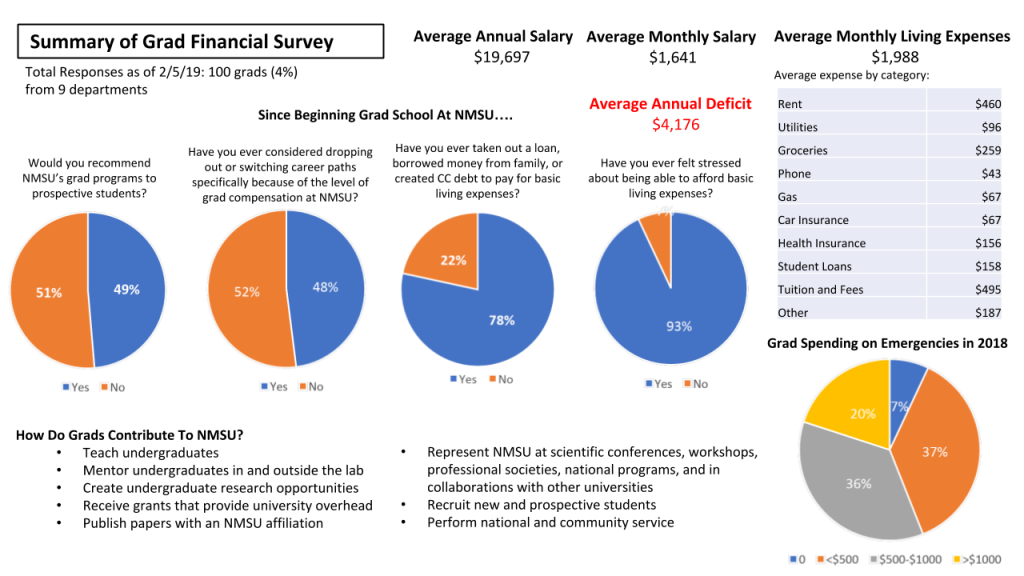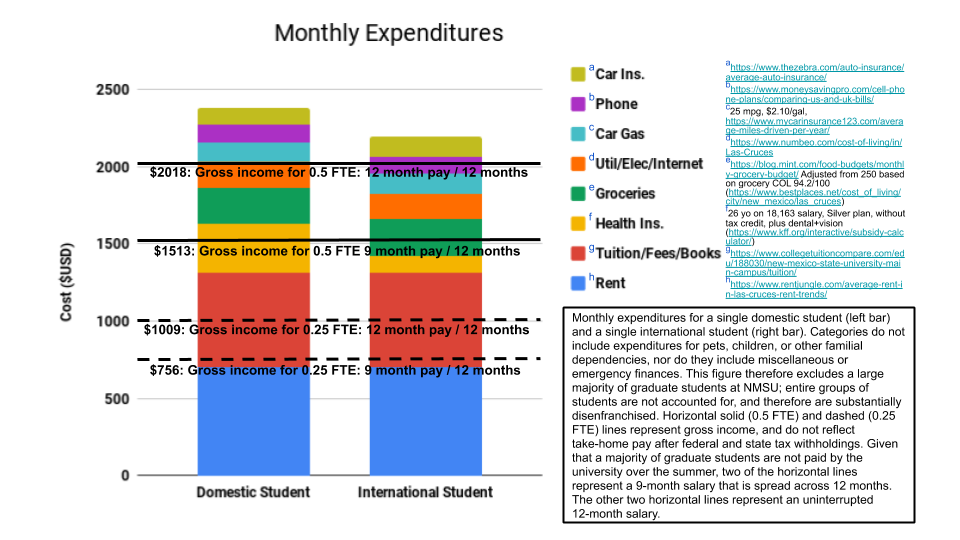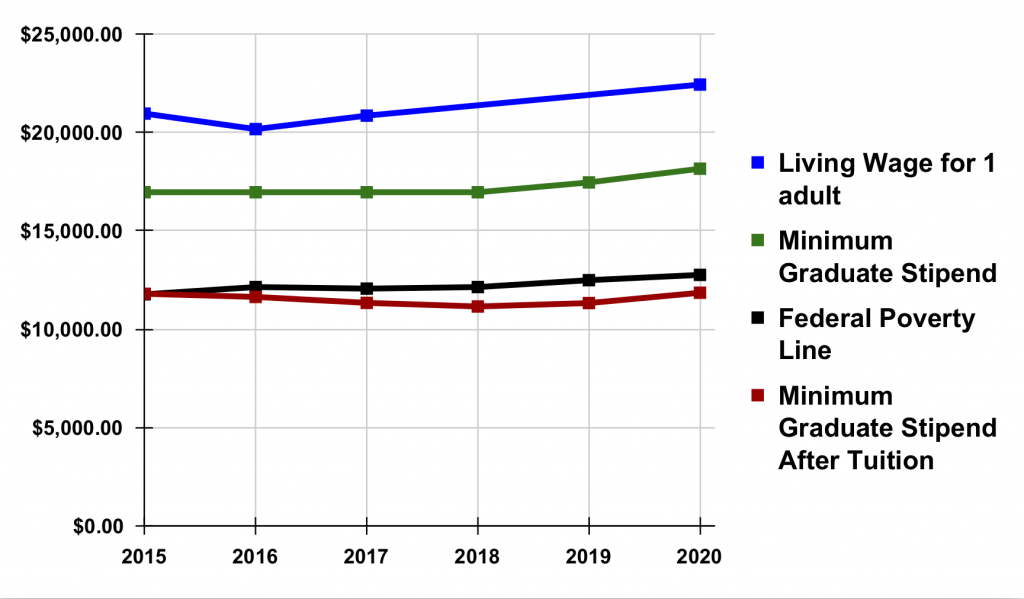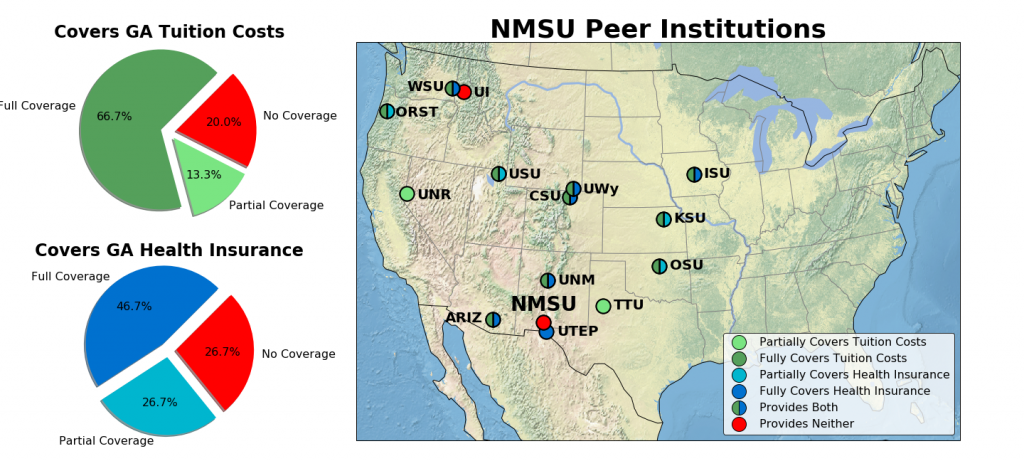A union gives us the right to negotiate as equals with the Administration over all aspects of our employment, from stipends to health insurance to tuition remission. As individuals, we have very little power to change things. But as a united group of over 900 NMSU graduate workers, we’ll be able to make significant improvements in our wages, benefits and working conditions. And those improvements will be guaranteed in a legally binding union contract.
What kinds of improvements can we win?
Sections:
- Just Compensation and Living Wages
- Full Tuition & Fees Remission
- Comprehensive and Affordable Insurance and Benefits
- Protections for International Students
- Real Grievance Procedures to Hold the University Accountable
Just Compensation and Living Wages
Graduate students at NMSU experience an average annual deficit of $4,176 (Figure 1). 48% of graduate students at NMSU have considered dropping out or switching career paths as a result of the unfair financial compensation (Figure 1). 78% of graduate students at NMSU have had to take out a loan, live under credit card debt, and/or borrow money from family in order to afford basic living expenses (rent, groceries, insurance, etc.) as a result of the unfair financial compensation (Figure 1).

Despite the tremendous labor that graduate workers provide the University and the fact that all graduate workers have advanced education and training in their field, the financial situation is dire. At NMSU, graduate workers on a 20-hour week salary earn $18,163 for the nine-month period of August to May (1). Most graduate workers must pay tuition, which as a full-time student (9 credit hours) is $6,312 for the academic year (2). This results in a pre-tax income of $11,851, which is well below the poverty threshold of $12,880 for single adults according to US Census data in 2019 (3). This does not include the cost of healthcare and other pertinent costs (see Figure 2).

Full Tuition & Fees Remission
A full-time graduate worker is enrolled in nine (9) credit hours per semester, which costs $3,156 in tuition and fees per semester (based on Fall 2020 costs), or $6,312 per year. Requiring graduate worker to pay for their tuition out-of-pocket pushes our take-home pay below the Federal Poverty Line (Figure 3). With this $6,312 tuition cost, many graduate students take out loans to pay tuition, with the average NMSU graduate assistant (GA) in a $4,100 annual deficit (according to a poll in February 2019). This mistreatment is unacceptable. The debt incurred by graduate workers during their time at NMSU reflects poorly on the university when graduates are worse off financially upon leaving their higher education than the were when it began.

Comprehensive and Affordable Insurance and Benefits
The cheapest market healthcare plan costs approximately $200/month and is not accepted at the Memorial Medical Center, the closest medical facility to the NMSU campus. Many graduate workers at NMSU travel to Juarez, Mexico for healthcare because they cannot afford healthcare in Las Cruces or El Paso. Not only does this contribute to the debt incurred by graduate workers, it also demonstrates how mismatched NMSU is compared to its peer institutions, many of which do in fact provide their graduate workers with subsidized health insurance (and tuition remission, see Figure 4). If NMSU wants to be competitive and attractive to prospective graduate workers, it must provide its graduate workers with comprehensive and affordable health insurance.

Protections for International Students
This financial situation carries additional negative consequences for international students. Due to their visas not allowing employment outside of their field, many international students who are only employed for nine (9) months by NMSU cannot get paid during the summer. Additionally, NMSU is required to provide international students with health insurance by law. However, this has amounted to unstable coverage and a lack of clarity over the provided plan. On top of this, the university requires payment for the insurance plan before international students can enroll in classes, often putting international graduate workers at a vulnerable financial situation at the beginning of the academic year.
A Real Grievance Procedure to Hold the University Accountable
Due to power imbalances common in academic situations and relationships, graduate workers at all universities across the world often experience abuse, manipulation, harassment, and coercion. There currently does not exist a formal grievance procedure through which graduate workers may report incidents and hold the university accountable when experiencing unfair treatment. A fair and safe procedure through which to express grievances and issues is vital to the safety, health, and well-being of graduate workers at NMSU.
